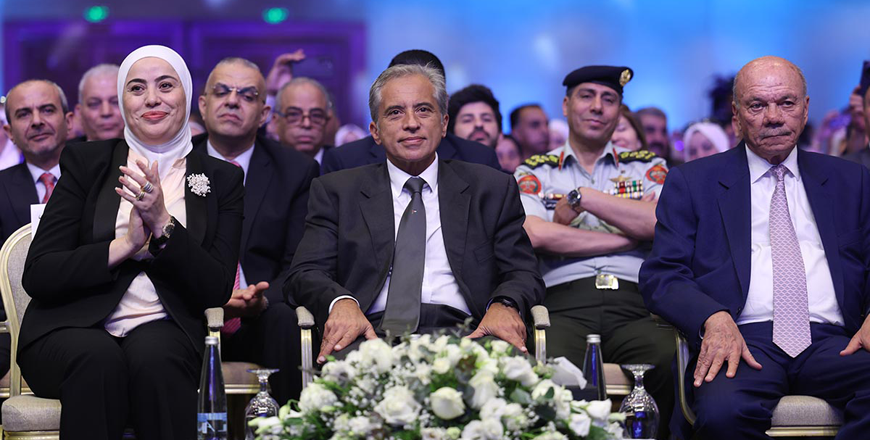You are here
Deputising for King, prime minister launches 2025-2033 National Social Protection Strategy
By Rana Husseini - May 10,2025 - Last updated at May 10,2025

Deputising for His Majesty King Abdullah, Prime Minister Jafar Hassan attends on Saturday the launching of the 2025-2033 National Social Protection Strategy (Petra photo)
DEAD SEA – Deputising for His Majesty King Abdullah, Prime Minister Jafar Hassan on Saturday attended the launching of the 2025-2033 National Social Protection Strategy, signaling a renewed commitment to strengthening the Kingdom's social protection system.
The launch ceremony was held at the King Hussein Bin Talal Convention Center on the Dead Sea and was attended by senior government officials, diplomats and representatives of civil society, political parties and the private sector.
The strategy, a key commitment in the government's policy statement to the Lower House, aims to expand the reach and impact of social protection programs through strengthening economic empowerment programs, and enhancing the efficiency of social assistance.
It introduces a four-pillar framework to address social assistance, service delivery, labor market integration, and crisis resilience.
Minister of Social Development Wafa Bani Mustafa, who chairs the strategy's high-level steering committee, the four pillars -dignity, empowerment, opportunity, and resilience- will work together to transform the social protection landscape in Jordan.
"Dignity" focuses on modernising social assistance systems, including improving targeting mechanisms and expanding integrated assistance programs. It also includes plans to institutionalise and expand the national school feeding program, Bani Mustafa said.
The minister added that the empowerment pillar emphasises professionalising social work, expanding inclusive education and training services, and improving access to care.
A new digital platform for social workers is in the pipeline, along with a classification system for associations and a digital registry of beneficiaries.
Access to health care is also an important component, she said, noting that it includes a unified social health insurance program based on a national social registry will be introduced, along with efforts to improve the quality and availability of family medicine services at primary health centers.
Under the opportunity pillar, the government is committed to making social security more inclusive and responsive to changing work dynamics. This includes coverage for flexible and part-time workers and improved conditions across sectors, she said.
Resilience, the fourth pillar, aims to prepare Jordan's social protection infrastructure for future shocks, such as economic downturns or humanitarian crises.
Plans include a crisis response fund, improved infrastructure for emergency services, and an early warning system integrated with national security institutions, according to the minister.
Bani Mustafa said the strategy's goals are rooted in the vision of a "dignified, empowered, and resilient Jordanian society" and aim to increase economic participation, improve the efficiency of social spending, and strengthen cooperation between government, civil society, and the private sector.
Also speaking during the event was UNICEF Representative to Jordan Phillipe Duamelle who pointed out that UNICEF has had the privilege to accompany the government of Jordan through the entire journey of social protection reform.
“What stands out in this updated strategy is its comprehensive and people-centered approach, as well as its consultative nature and focus on inclusive and integrated social protection services,” Duamelle told the gathering.
It recognises that social protection is not just about addressing poverty—it is about enabling inclusion, building resilience, and promoting equity, the UN official said.
“In all these ways, the strategy not only responds to current needs, but lays the groundwork for longer-term, transformative change—especially for children and their families,” according to Duamelle.
It is also about investing in the future of Jordan, Duamelle added.
Meanwhile, World Bank (WB) Resident Representative in Jordan Holly Benner expressed her pride in the WB’s long-standing partnership in Jordan’s social protection journey, supporting reforms and expansion since 2018.
“We are pleased to see Jordan emerge in the region and globally as one of the countries at the forefront of building resilient and sustainable social protection systems—now many other countries are looking to Jordan in developing their own models and approaches,” Benner said.
Benner stressed the WB’s commitment to supporting the successful implementation of the new strategy through a combination of “financing and technical assistance under the recently signed, US$400 million Resilient and Sustainable Social Protection Program”.
“This reflects a shift toward a “next generation” system, one that is more resilient, integrated, and sustainable,” Benner told the gathering.
European Union (EU) Ambassador to Jordan Pierre-Christophe Chatzisavas stressed that the EU is on the side of Jordan for the long haul.
“Our engagement on social affairs is important and durable. Our current portfolio stands at EUR120 million that we give to Jordan,” Chatzisavas said.
More than half of this comes from funding in response to the Syrian refugee crisis, showing that our support is for the country as a whole, and it is intertwined with our bilateral cooperation, Chatzisavas added.
“Over the last decade, we have supported assistance, social services through the centres in the country, and also assistance to persons with disabilities,” Chatzisavas told the gathering.
The strategy was developed following nationwide consultations involving stakeholders from all sectors, including parliamentarians, academics, community leaders, and non-governmental organisations.
The launch event featured a presentation on the strategy's development process and a performance by children from the Al Hussein Society-Jordan Center for Training and Inclusion, underscoring the inclusive vision behind the new framework.
Bani Mustafa thanked European Union and UNICEF for their support of the development of the updated strategy.












